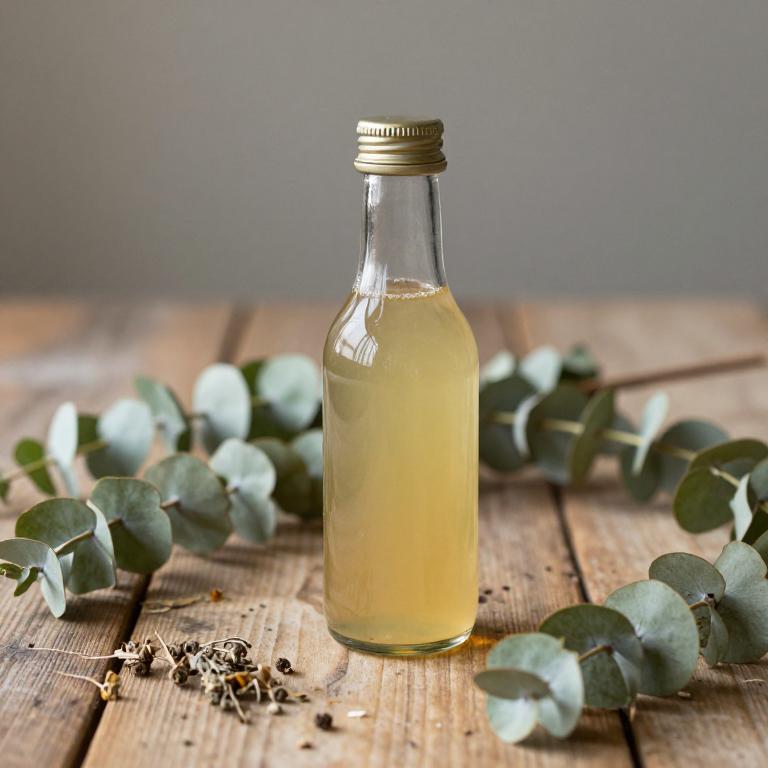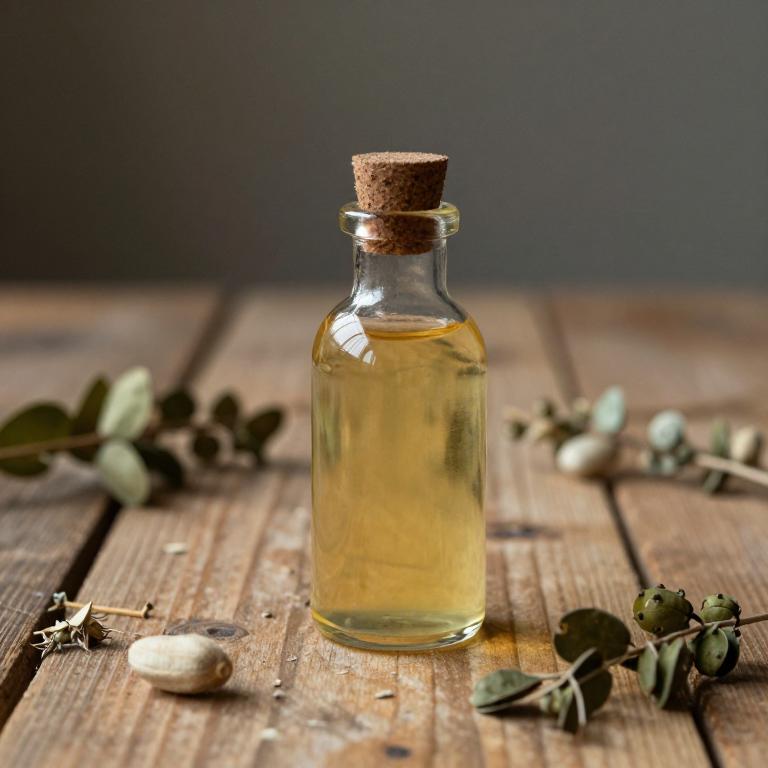10 Best Herbal Juices For Toothache

Herbal juices have been traditionally used to alleviate toothache by soothing inflamed gums and reducing bacterial growth.
Common herbs like clove, mint, and echinacea are often included in these juices for their natural analgesic and antimicrobial properties. Clove juice, in particular, contains eugenol, which acts as a powerful pain reliever and antiseptic. Drinking herbal juices can provide a natural alternative to conventional pain medications, though they should not replace professional dental care.
It is important to consult a healthcare provider before using herbal remedies, especially if the toothache persists or is severe.
Table of Contents
- 1. Salvia (Salvia officinalis)
- 2. Ginger (Zingiber officinale)
- 3. Eucalyptus (Eucalyptus globulus)
- 4. Black pepper (Piper nigrum)
- 5. Peppermint (Mentha piperita)
- 6. Oregano (Origanum vulgare)
- 7. Aloe vera (Aloe barbadensis)
- 8. Rosemary (Rosmarinus officinalis)
- 9. Ceylon cinnamon (Cinnamomum verum)
- 10. Fennel (Foeniculum vulgare)
1. Salvia (Salvia officinalis)

Salvia officinalis, commonly known as sage, has been traditionally used for its medicinal properties, including its potential to alleviate toothache.
The herbal juices derived from sage leaves contain compounds such as thujone and rosmarinic acid, which may possess antimicrobial and anti-inflammatory effects. These properties can help reduce gum inflammation and combat oral bacteria that contribute to tooth pain. To use sage juice for toothache, it can be applied directly to the affected area using a cotton ball or diluted with water for a soothing rinse.
While sage may offer temporary relief, it is advisable to consult a dentist for persistent or severe tooth pain.
2. Ginger (Zingiber officinale)

Zingiber officinale, commonly known as ginger, has been traditionally used for its medicinal properties, including its ability to alleviate toothache.
The active compounds in ginger, such as gingerol and shogaol, possess anti-inflammatory and analgesic effects that can help reduce pain and swelling associated with toothaches. To prepare a ginger herbal juice, fresh ginger root is typically grated and blended with water or a mild herbal tea. This juice can be applied directly to the affected area using a clean cloth or swished in the mouth to provide localized relief.
While ginger juice may offer temporary comfort, it is advisable to consult a dentist for proper diagnosis and treatment of persistent tooth pain.
3. Eucalyptus (Eucalyptus globulus)

Eucalyptus globulus, commonly known as the blue gum eucalyptus, has been traditionally used for its medicinal properties, including its potential to alleviate toothache when incorporated into herbal juices.
The essential oils derived from its leaves contain compounds like eucalyptol and cineole, which possess antimicrobial and anti-inflammatory effects that may help reduce dental infections and gum inflammation. When blended into a herbal juice, eucalyptus globulus can provide a natural remedy that soothes pain and promotes oral hygiene. However, it is important to note that while it may offer some relief, it should not replace professional dental care.
Always consult a healthcare provider before using eucalyptus-based remedies for persistent or severe toothache.
4. Black pepper (Piper nigrum)

Piper nigrum, commonly known as black pepper, contains compounds like piperine that may have anti-inflammatory and analgesic properties, making it a potential natural remedy for toothache.
While there is limited scientific research on using black pepper herbal juices specifically for tooth pain, some traditional practices suggest that its essential oils or diluted extracts might help reduce inflammation and numb the area. To prepare a herbal juice, the dried berries of Piper nigrum are often ground and mixed with water or other herbal extracts, though it is important to use caution to avoid irritation. Despite its possible benefits, it is not a substitute for professional dental care, and individuals should consult a dentist for persistent or severe tooth pain.
Overall, while Piper nigrum may offer some relief, its effectiveness as a toothache remedy remains largely anecdotal and requires further scientific validation.
5. Peppermint (Mentha piperita)

Mentha piperita, commonly known as peppermint, is often used in herbal juices to alleviate toothache due to its cooling and analgesic properties.
The essential oils in peppermint, particularly menthol, help reduce inflammation and numb the pain, providing temporary relief. Peppermint juice can be applied directly to the affected area using a cotton ball or diluted with water for safer use. It is important to note that while peppermint may offer some comfort, it should not replace professional dental care.
This natural remedy is best used as a complementary treatment alongside conventional methods for toothache relief.
6. Oregano (Origanum vulgare)

Origanum vulgare, commonly known as oregano, has been traditionally used for its medicinal properties, including its potential to alleviate toothache when incorporated into herbal juices.
The essential oils in oregano, particularly carvacrol and thymol, possess strong antimicrobial and anti-inflammatory effects that can help reduce bacterial infections and inflammation in the mouth. To prepare an oregano herbal juice, fresh or dried oregano leaves are typically blended with water or a mild citrus juice to enhance flavor and absorption. This juice can be applied directly to the affected area using a cotton ball or consumed in small amounts to soothe pain and promote healing.
While oregano juice may offer natural relief, it is advisable to consult a healthcare professional for persistent or severe toothache, as it should complement, not replace, proper dental care.
7. Aloe vera (Aloe barbadensis)

Aloe barbadensis, commonly known as aloe vera, has been traditionally used for its soothing and anti-inflammatory properties, making it a potential natural remedy for toothache.
When used in the form of herbal juices, aloe vera can help reduce gum inflammation and soothe the sensitive tissues around the affected area. Its high concentration of vitamins, enzymes, and antioxidants may aid in healing oral wounds and alleviating pain. However, it is important to note that aloe vera juice should not replace professional dental care, especially for severe or persistent tooth pain.
While some people find relief using aloe vera as a complementary remedy, it is always advisable to consult a dentist for proper diagnosis and treatment.
8. Rosemary (Rosmarinus officinalis)

Rosmarinus officinalis, commonly known as rosemary, has been traditionally used for its aromatic and medicinal properties, including its potential to alleviate toothache.
Rosemary contains compounds like rosmarinic acid and carnosic acid, which possess anti-inflammatory and analgesic effects that may help reduce pain and swelling associated with dental issues. When brewed into a herbal juice, rosemary can be applied topically to the affected area or consumed in small amounts to soothe the gums and reduce inflammation. However, it is important to note that while rosemary may offer some relief, it should not replace professional dental care for persistent or severe tooth pain.
Always consult a healthcare provider before using herbal remedies, especially if you have underlying health conditions or are taking medications.
9. Ceylon cinnamon (Cinnamomum verum)

Cinnamomum verum, commonly known as true cinnamon, has been traditionally used in herbal remedies for its potential soothing properties against toothache.
The essential oils found in cinnamon, particularly cinnamaldehyde, possess antimicrobial and anti-inflammatory effects that may help reduce pain and infection in the mouth. When used in the form of herbal juices, cinnamon can act as a natural remedy by numbing the pain and decreasing swelling around the affected area. However, it is important to note that while cinnamon may provide temporary relief, it should not replace professional dental care for persistent or severe toothaches.
For best results, cinnamon juice can be diluted with water and applied topically or used as a mouthwash, but caution should be exercised to avoid irritation of the oral tissues.
10. Fennel (Foeniculum vulgare)

Foeniculum vulgare, commonly known as fennel, has been traditionally used in herbal medicine for its soothing properties, including its potential to alleviate toothache.
The essential oil of fennel contains compounds like anethol and limonene, which possess anti-inflammatory and analgesic effects that may help reduce pain and inflammation associated with dental issues. To prepare a fennel herbal juice for toothache, fresh fennel seeds or leaves can be crushed and mixed with water or a mild carrier oil, then applied directly to the affected area or used as a mouth rinse. This natural remedy is believed to help ease discomfort by numbing the gums and reducing bacterial activity in the mouth.
While fennel juice can offer temporary relief, it should not replace professional dental care for persistent or severe tooth pain.